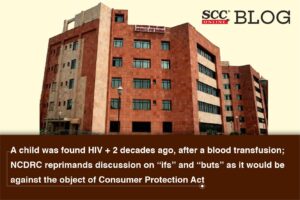National Disputes Redressal Commission (NCDRC): The Coram of Justice R.K. Agrawal (President) and Dr S.M. Kantikar (Member), on finding that a child was found to be HIV positive after 5 years of his operation for correction of diaphragmatic hernia, held that compensation, in this case, cannot be measured in monetary terms.
Background
The appellants challenged against the impugned order passed by the State Consumer Disputes Redressal Commission whereby the appellants 2 and 3 were directed to pay a sum of Rs 10 lakh holding liable for medical negligence.
Facts of the Case
The complainant, Master Akash after the birth at the age of 3 days was operated on for the correction of diaphragmatic hernia and the same was performed by OP 3 at Kalawati Saran Children Hospital (OP 2). During the operation, the baby was given a blood transfusion twice and the blood was brought from the Blood Bank at Sucheta Kriplani Hospital (OP 4).
In the year 2003, Master Akash developed a disease of eye and after consultation, X-rays chest, blood test were conducted, but it was alleged that the treating Doctor never advised HIV testing because of fear being exposed. Again in 2005, the child suffered diffuse pain in the abdomen and was consulted in OPD and on the insistence of the well-wishers, the parents of Master Akash got HIV Testing Done.
In 2006, it was reported that the child was HIV Positive – AIDS and he was admitted for further treatment to Safdarjung Hospital. Later, he remained under observation at AIIMS and Safdarjung Hospital.
Further, it was alleged that the entire episode was a sheer deficiency and medical negligence on the part of the OPs.
On being aggrieved, the complainant filed a complaint before the State Commission seeking compensation of Rs 22 lakhs and 18% interest. The State Commission partly allowed the complaint and directed the OPs 2 and 3 to pay Rs 10 lakhs as compensation.
Further, on being aggrieved with the above, the present appeal was filed by the OPs.
Analysis, Law and Decision
The Commission observed that,
“Contaminated blood is a potential source of transmission of HIV.”
In view of the above, the possibility of contracting HIV from blood or other blood-contaminated appliances cannot be excluded in the case of Master Akash.
Coram noted that, the Opposite Parties failed to produce the blood bank register and the test reports to prove that the blood units were HIV negative. It is pertinent to note the B+ blood was issued twice.
Further, it was evident that the child Akash was detected HIV positive in the year 2006 i.e. after 5 years of blood transfusion and during the said period he frequently suffered recurrent respiratory tract infections and took treatment from various hospitals.
Coram stated that, there was a possibility of HIV infection due to other sources cannot be ruled out. Hence, it is difficult to conclusively attribute the negligence of the OPs who transfused blood to Master Akash.
“…the child contracted HIV and throughout his life he has to live with HIV and he subsequently likely to develop complications of AIDS.”
Therefore, considering the facts and the nature of disease, in the ends of justice, Commission affirmed the compensation awarded by the State Commission.
Coram added that, the allegation of the Complainant’s son of having contracted HIV from the transfusion of contaminated blood at KSCH, which was supplied by RSSB blood bank. As per Schedule F (K) to the Drugs and Cosmetic Rules, it is made to try to perform tests on blood for transmissible diseases like HIV, Hepatitis B and C, Malarial Parasites, VDRL and syphilis. Complete donor screening with a detailed questionnaire was very important.
“If the blood donors are in window period, HIV test may be negative.”
The next pivotal question is whether or not the treating doctor had taken a valid or real Consent from the Complainant before the blood transfusion.
The OPs did not place any cogent evidence in regard to the above, hence it amounts to a deficiency in service of the treating doctors.
Moving further, the Commission found that it has been 2 decades, therefore at this stage discussion on “ifs” and “buts” is certainly injustice to the HIV victim and against the object of the benevolent Consumer Protection Act.
Coram noting the fact that the complainant had claimed compensation of Rs 22 lakhs with interest @18% per annum expressed that, to award just and fair compensation, several points are to be considered like the actual expenses for the medical treatment, travel and emotional sufferings of the parents.
Adding to the above, the Commission stated that the life expectancy of Master Akash cannot be ignored and the same would depend on strict regular ART and a healthy diet.
“At present, the child is around 24 years of age. Certainly, he has already undergone untold sufferings and in future, he will still continue to suffer HIV related stigma and discrimination. The compensation cannot be measured in monetary terms.”
Hence, in Commission’s opinion, on priority, the child should be provided adequate health facilities and benefits through different welfare schemes of the Government for HIV Positive people.
In view of the above discussion, the appellant was directed to pay Rs 10 lakhs to the complainant. [Government of India v. Master Akash, FA No. 764 of 2012, decided on 25-5-2022]
Advocates before the Commission:
For the Appellants: Mr Sanjib Kumar Mohanty, Advocate
For the Respondents: Mr Deepak Dewan, Advocate and Mr Virender Kumar, AR

